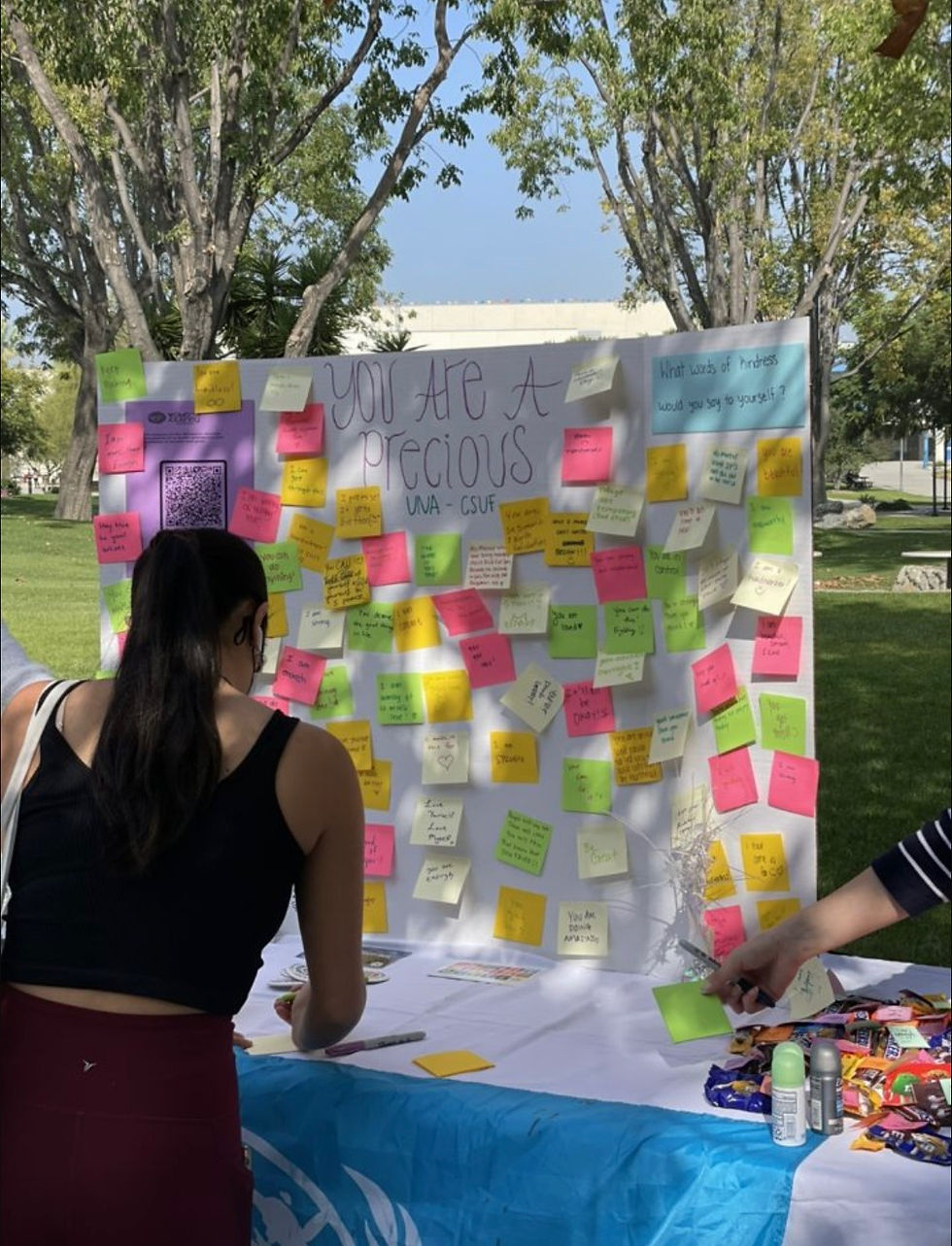UNA-CSUF at the 2023 Global Engagement Summit
- Chelsea Arangcon
- Feb 17, 2023
- 3 min read
After three years of virtually attending UNA-USA’s Global Engagement Summit, UNA-CSUF finally had the chance to attend the annual conference in-person. The conference was held on Friday, Feb. 17, at the United Nations headquarters. Over 800 attendees were expected to attend in person and more tuned in virtually.
There were 10 panels hosted all day, however we will specifically discuss the “Actualizing the Sustainable Development Goals” and “Preserving our Cultural Heritage.”
Harshani Dharmadasa, senior director of Global Partnerships and Initiatives UN Foundation, moderated the “Actualizing the Sustainable Development Goals” panel with speakers Jamal Hill and Jenn Mozen. In this panel, Hill and Mozen shared concrete actions they have taken towards the 17 SDGs.
Mozen, vice president of Delivery at Innerview, discussed how students contributed over a million hours towards making an impact on the SDGs. The top four SDGs students contributed to were Goal 4: Quality Education, Goal 3: Good Health and Well-Being, Goal 11: Sustainable Cities and Communities and Goal 16: Peace, Justice and Strong Institutions.
At Delivery, Mozen said fostering curiosity in students motivates them to contribute to the SDGs. Considering students at the poverty level, one way students are actualizing the SDGs is by sharing their closets and starting community gardens. As a result, students can take fresh produce when they need it.
Hill, president and founder of Swim Up Hill Foundation and a UN 2022 Young leader for the SDGs, said it’s important to educate communities and provide access to resources.
“It’s important to meet people where they are,” Hill said.
Hill’s foundation focuses on teaching one million people how to swim all over the world per year. Hill said by meeting people where they are can start in their homes. “As long as you had access to clean drinking water and a bowl big enough to put your face in, you could start this process of overcoming a fear of water,” Hill said.
Ending the panel, Mozen and Hill each shared a tip for students to become involved. Mozen encouraged students to get involved, whether by joining a club, group or finding a friend. Hill urged students to stay curious and open to learning.
The “Preserving Our Cultural Heritage” panel was moderated by Kathryn Kross, executive director of Communications at the Better World Campaign. The discussion centered around cultures of Indigenous people and people of African descent, specifically preserving these cultures, and UNESCO’s mission to also preserve cultural heritage sites. In this discussion, Kross moderated the discussion between three panelists, Justin Hansford, Christiana Eala and Estelle Zadra.
Hansford, founder and director of the Thurgood Marshall Civil Rights Center and member of the UN’s Permanent Form of African Descent, said he believed in preserving African American artifacts as sacred and should be recognized by the UN. Eala, director of Tiyospaye Winyan Maka and a traditional Lakota grandmother, said without preserving Indigenous people’s artifacts, a lot of knowledge would be lost.
Senior liaison officer at UNESCO, Zadra, shared UNESCO’s mission to protect cultural sites and urged the importance of education. In educating the next generation, UNESCO can ensure that the next generation will take better care of the planet and cultural heritage sites. Zadra also emphasized the importance of preserving intangible heritage, some examples including traditions, food, music and more.
Heading into the future, Hansford believed in maintaining Historically Black Colleges and Universities’ institutions since many of these places are the original infrastructures and are sacred projects in the education of formerly enslaved people. For Indigenous people, Eala said the next step in preserving cultural heritage is the establishment of the first Indigenous United Nations. Additionally, Hansford and Eala highlighted the intersectionality of different cultures and importance of a global community.
“If there’s anything I want folks to take away from these projects, is that we are global citizens and we are a part of a human family and we have to begin to see ourselves as that,” Hansford said.
Zadra touched upon UNESCO’s challenges of preserving culture, which included many factors such as libraries in war zones and climate change. Preserving cultural heritage sites include protecting biospheres and ecological systems, which Zadra believes is important to work closely on with Indigenous people. Mentioned earlier in the panel, Eala discussed Indigenous people’s close relationship with nature.
“We’ve always taken care of the air, the water, the land,” Eala said.
Just like these two panels, the other eight panels were equally informative and offered invigorating discussions and insight. UNA-CSUF was so grateful to finally be able to attend in-person and connect with like-minded individuals. For those who’d like to check out the rest of the panels, check out the UN’s Web TV for the morning panel and the afternoon panel.



Comments